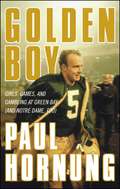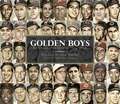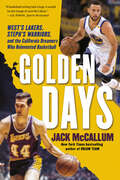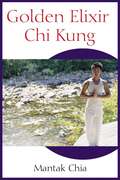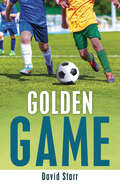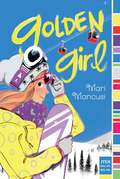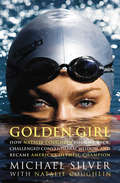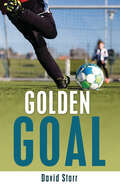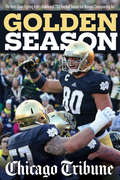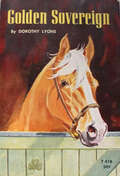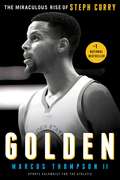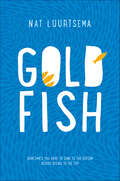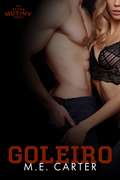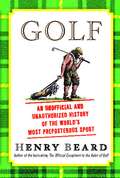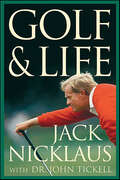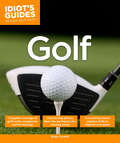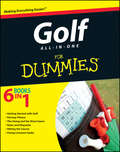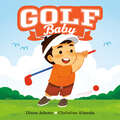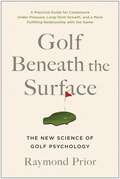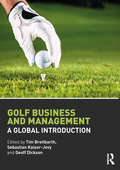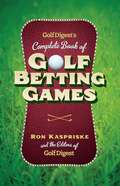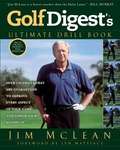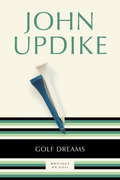- Table View
- List View
Golden Boy
by Paul HornungPaul Hornung was football's "Golden Boy" -- handsome, talented, and fabulously successful. He had a great career at Notre Dame, where he won the Heisman Trophy (the only player ever to win it on a team with a losing record). He was the #1 draft pick in the NFL and went to the Green Bay Packers, a terrible team soon transformed by a new head coach, Vince Lombardi. Hornung's Packer teams would become a dynasty, and ten of his teammates (as well as Lombardi) would eventually join him in the Pro Football Hall of Fame. Hornung led the NFL in scoring from 1959 to 1961, setting a single-season scoring record in 1960 that still stands. He was Player of the Year in 1960 and 1961.Hornung always loved the good life. He had girlfriends all across the country, and he was a regular at Toots Shor's and at clubs in Chicago and Los Angeles. A frustrated Lombardi once asked him whether he wanted to be a player or a playboy, and his teammates joked about his Hollywood ambitions. On game days Hornung was always ready to play, but the night after a game -- and sometimes even the night before -- was a different story.For Hornung, the good life came at a price: his gambling cost him a year's suspension from the NFL in 1963. He accepted his punishment, refusing to implicate anyone else, but in this autobiography he reveals just how widespread gambling was in the NFL. However, on the playing field Hornung and his Packer teammates made football history. Bart Starr, Max McGee, Jim Taylor, Ray Nitschke, Jerry Kramer, Jim Ringo, Ron Kramer, Forrest Gregg, Fuzzy Thurston, Willie Davis, Herb Adderley, Willie Wood -- they're all here, and Hornung has great stories to tell about them and about some of their biggest games together.Golden Boy is a must-read for football fans, a colorful, candid slice of pigskin history from one of the game's immortal legends.
Golden Boys: Baseball Portraits 1946-1960
by Christopher Jennison Andy JurinkoRenowned artist Andy Jurinko believed the golden age of baseball was 1946-1960, an era that, not coincidentally, coincided with his childhood. It was a time that welcomed such legendary stars as Willie Mays, Mickey Mantle, Jackie Robinson, Ted Williams, and Henry Aaron into the national consciousness, a fifteen year stretch marked by Robinson's breaking of the color barrier in 1947 and by ten Yankee championships. Jurinko spent twenty years creating more than 600 portraits of the colorful characters and stadiums that typify this era, all collected here for the first time in Golden Boys. With illuminating text by sportswriter Christopher Jennison, Golden Boys is the definitive artistic portrait of a remarkable time in American sports history.
Golden Days: West's Lakers, Steph's Warriors, and the California Dreamers Who Reinvented Basketball
by Jack MccallumThe bestselling author of Dream Team tells the interconnected stories of the NBA champion Golden State Warriors and the early-1970s Los Angeles Lakers, two extraordinary teams playing in extraordinary times and linked by one extraordinary man: Jerry West. During their 1971–72 championship season, the L.A. Lakers won thirty-three games in a row, a streak that still stands as the longest and greatest in the history of American professional sports. It was a run of uninterrupted dominance that predated by decades the overwhelming firepower of today’s Warriors, a revolutionary team whose recent seasons include some record-threatening win streaks of their own. In Golden Days, acclaimed sports journalist Jack McCallum uses these two teams—the Jerry West/Wilt Chamberlain/Elgin Baylor Lakers and the Stephen Curry/Kevin Durant/Draymond Green Warriors—to trace the dynamic history of the National Basketball Association, which for much of the last half-century has marched memorably through the state of California. Tying together the two strands of McCallum’s story is Hall of Famer West, the ferociously competitive Laker guard who later became one of the key architects of the Warriors. With “the Logo” as his guide, McCallum takes us deep into the locker rooms and front offices of these two era-defining teams, leveraging the access and authority he has amassed over his forty-year career to create a picture of the cultural juggernaut that the NBA has become. Featuring up-close-and-personal portraits of some of the biggest names in basketball history, from the larger-than-life Wilt Chamberlain to the innovative Warriors coach Steve Kerr to the transcendent duo of Curry and Durant, Golden Days is a history, not just of a changing sport, but a changing America, as seen through the prism of two teams that ruled the league during times of violence and political turmoil—the Charles Manson murders and the athlete-activist in the age of Trump among the narrative backdrops. In the end, McCallum’s book leaves an indelible portrait of West, the man who lived, played, and worked through it all—and who remains, on the cusp of his eightieth birthday, one of the most vital, complicated, and compelling figures in all of sports.Advance praise for Golden Days “With his classic eye for detail and deadpan wit, Jack McCallum connects two of the greatest teams in sports history through the endlessly fascinating persona of Jerry West. McCallum manages to unearth new details about some of the giants of the game, while shining a light on overlooked figures such as Elgin Baylor, delivering an original, fascinating, and breezy read.”—Zach Lowe, senior writer, ESPN “I spent some of the 2016–17 season working as a consultant for the Golden State Warriors, but even I didn’t know every detail of how this championship team came together. Golden Days breaks that all down and shows how the Warriors have revolutionized basketball.”—Steve Nash, two-time MVP
Golden Elixir Chi Kung
by Mantak ChiaTechniques for preparing and using the Golden Elixir to achieve optimum health and spiritual vitality •Includes practical exercises and postures to produce regenerative effects in one’s own saliva •Reveals how combining saliva with the hormonal fluids released during sexual practices creates the Elixir of Immortality Golden Elixir is the fountain or water of life. It is the combination of saliva, hormonal fluids, and external essences that when mixed together become the Elixir of Immortality. Saliva has long been considered by Taoists as a key component for optimum health. Some Taoist texts recommend swallowing the saliva up to 1,000 times a day to promote physical healing. Thousands of years ago Taoists became aware of changes in the taste and consistency of saliva that accompanied meditative practices. They learned that by combining saliva with the hormonal fluids and essences released during sexual activities a powerful elixir is formed. Taoists believe that this Golden Elixir is not only a physical healing agent, but also is a major transformative agent in preparing for higher spiritual work.Golden Elixir Chi Kung contains twelve postures that develop and utilize the healing power of saliva. Ten of these involve gathering energy and forces through the body’s hair, which acts as a negative-energy filter and can also be used to store surplus positive energy. Taoists regard the hair as antennae extending out into nature and the universe. By utilizing the practices in this book, readers can develop self-healing abilities and establish a better connection to the universe as a whole.
Golden Game (Soccer United: Team Refugee)
by David StarrAbbas is a Syrian refugee and a striker on a junior high soccer team of refugee and immigrant players. He is excited when his team is sponsored to play a big tournament, where he can reconnect with a friend from Syria. But a traffic accident triggers Abbas to experience anxiety and flashbacks to the violence in Syria. He finds ways to conquer his flashbacks and anxiety before the big tournament and also helps his whole team deal with the pressure of the competition. Golden Game is one of four books that offer readers insight into the experiences of refugee youth as they adjust to life in North America. Distributed in the U.S by Lerner Publishing Group.
Golden Girl
by Mari MancusiA snowboarding prodigy tries to reclaim her standing as the "Golden Girl" at her elite winter sports academy in this brand-new M!X novel.Lexi Miller--a.k.a. "Golden Girl"--is the snowboard cross queen. As the most promising student at her elite Vermont ski and snowboard school, Mountain Academy, Lexi is a shoo-in for the Olympic-level trial team. That is, until a freak fall during a snowboard-cross competition crushes her dreams and puts her future at stake. A year later, Lexi's back at school, physically healed, but still mentally scarred. Every time she straps on her snowboard, severe panic attacks set in. To make matters worse, her best friend has turned her back on her, her archenemy on and off the slopes is determined to make her life miserable, and everyone is treating her like an outcast. The only person who seems to understand is Logan Conrad, a "staff rat" whose mother works on the mountain. Lexi finds herself drawn into his world just off the mountain, and discovers she has a knack for singing--something her new friends encourage. But Lexi's dad--who also happens to be her coach and lead instructor at school--has different ideas about his daughter's new friends and talent. Will Lexi ever be able to figure out what exactly happened on the mountain a year ago while trying to balance her own dreams with the dreams her father has for her?
Golden Girl: How Natalie Coughlin Fought Back, Challenged Conventional Wisdom, and Became Ame rica's Olympic Champion
by Michael Silver Natalie CoughlinThe story of Natalie Coughlin's remarkable battle back from injury and burnout to be-come America's Golden Girl—a two-time Olympic Gold Medal winner in swimming and the most decorated female athlete at the 2004 OlympicsFive years ago, Natalie Coughlin's promising swimming career was all but extinguished when a devastating shoulder injury ended her dreams for the 2000 Olympics. After becoming, at age 15, the first person ever to qualify for all 14 women's events at the U.S. Nationals, she seemed destined to follow the path of so many other young swimming stars—devoured by an oppressive training schedule.In Golden Girl, Sports Illustrated's Michael Silver—coauthor of many bestselling sports memoirs—including Dennis Rodman's, Kurt Warner's, and Jerry Rice's—tells the story of Natalie's remarkable journey back from the brink. With complete access to her family, friends, coaches, teammates, and adversaries, Silver details how she made the crucial choice to train with University of California coach Teri McKeever. Together the two, star and coach, have defied long-standing training methods, forcing the swimming community to rethink the ways in which it treats its talent. An inspirational story of a complex and courageous young athlete, Golden Girl is also a fascinating portrait of the fractious world of competitive swimming.
Golden Goal (Soccer United: Team Refugee)
by David StarrWhen Dylan doesn't get off to a good start at his new school and gets in trouble for fighting, he has to join the soccer team with a group of immigrant and refugee students who play on a rough, gravel field. Mocked by his old team, Dylan becomes determined to bring his new team to the championship finals. Getting to know his teammates opens Dylan's eyes about hardship, and shows him the value of a goal that wins in sudden-death play—a golden goal. Golden Goal is one of four new books that offer readers insight into the experiences of refugee youth as they adjust to life in North America. Distributed in the U.S by Lerner Publishing Group.
Golden Season
by Chicago Tribune StaffEntering the 2012 season unranked, Notre Dame stunned college football by achieving a perfect record and ending the regular season ranked as the number-one team in the country. Behind senior linebacker Manti Te'o and third-year coach Brian Kelly, the Fighting Irish also earned a spot in the BCS National Championship Game. Readers can now relive the grit and glory of Notre Dame's improbable run in Golden Season: The Notre Dame Fighting Irish's Undefeated 2012 Football Season and National Championship Bid.This book features the best reporting and commentary on the team from the award-winning staff of the Chicago Tribune, recapping the Irish's magical 12-0 regular season through the eyes of veteran college football reporters and columnists. Golden Season is the perfect way to celebrate Notre Dame's undefeated regular season campaign and look back at the national championship game versus the University of Alabama Crimson Tide.
Golden Sovereign (Connie McGuire #3)
by Dorothy LyonsConnie McGuire, glowing with pride in her two mares, Silver Birch and Midnight Moon, is equally happy with Silver Birch's first colt Sliver, soon named Golden Sovereign, for his beautiful palomino coat. Connie hasn't given up rescuing horses however, as when she goes into town to buy a dress for a Valentine's Day party she comes home with a battered, worn down neglected mare, which she bought at an auction to save from further abuse. Connie knows that this horse, though not pretty now, has beautiful breeding and must have at one time been quite a beauty, but how could she and Pete find out about Lady Luck's past? Her dreams and hopes of her new stable, Shamrock Stables, hinge on finding out about Lady Luck's past and on having Golden Sovereign as a gentle and majestic horse. But Sliver has developed bouts where he is anything but gentle, and at times is so dangerous even Connie fears he is turning into a killer. What is turning Golden Sovereign into a mean horse? Connie and Peter must work against a frightening deadline to solve the problem ... and to save their future! Can she pull off her dreams?
Golden: The Miraculous Rise of Steph Curry
by Marcus ThompsonThe incredible and inspiring story of Stephen Curry, the greatest shooter basketball has ever seen, and the ascension of the Golden State Warriors, a team on the verge of being an NBA dynasty, by long-time Warriors beat reporter and Bay Area News Group sports columnist Marcus Thompson.When it comes to Stephen Curry—point guard for the Golden State Warriors and reigning MVP of the NBA—journalists, fans, and sports analysts are running out of ways to say “wow.” Deemed too small and too short at 6’3 and 180 pounds by NBA coaches around the league, Curry has taken the game back from the bigger men who usually dominate the court. With his incredible shooting ability that started a “three-point revolution” he led the Warriors to seventy-three wins in the 2015-2016 season, beating out Michael Jordan and the 1996 Chicago Bulls’ long-time record. Told by Marcus Thompson, a lifelong Warriors insider who has been reporting on the team for twelve seasons, Golden is the definitive story of this singular talent. Thompson explores this all-star player, his love for the game and his team, and his close-knit and supportive family—including his Instagram celebrity chef wife Ayesha and adorable young daughters. From avid fans to newcomers of the sport, Curry has become a role model for both children and aspiring players everywhere. And he leads the ultimate team, a collection of talent and personalities that complement Curry’s game and push him to heights no one ever imagined for a kid from Davidson or this beleaguered franchise. These Warriors have carved out their place in history as one of the most memorable and transformative the NBA has ever seen. And they are led by a superstar who has solidified his place among the greats.
Goldfish
by Nat LuurtsemaI am Lou Brown:Social outcast, precocious failure, 5'10" and still growing. I was on the fast track to the Olympic superstardom. Now, I'm training boys too cool to talk to me. In a sport I just made up. In a fish tank.My life has quickly become very weird. Nat Luurtsema's YA debut is side-splittingly funny and painfully true to anyone who's just trying to figure out how they fit into the world.
Goleiro (Texas Mutiny #3)
by F. Rocha M. E. CarterGoleiro substantivo um jogador na baliza cujo dever é impedir a bola de entrar ou cruzar Veja Santos e Mariana DeGuajarado Como goleiro do Texas Mutiny, Santos é muito bom em proteger essa rede. Mas ele nunca se preocupou em proteger seu casamento. Deixando a fama e a notoriedade subirem à cabeça, ele perdeu as coisas que mais amava... Sua esposa e filhos. Agora ele tem uma chance para acertar antes de perder neste jogo de relacionamento e está determinado a não perder esse momento. Mariana foi marcada tão profundamente pelas traições de Santos, que ela carregará as feridas para sempre. Depois de quase dez anos de casamento, ela o conhece bem e sabe que ele não vai deixar passar sem lutar. Ainda assim, ela se recusa a ser insistente. Porque o amor nunca é suficiente...
Golf
by Henry Beard* An ingenious mix of facts and flights of fancy: The history of golf begins in 732 AD, when a relic of St. Andrew--patron saint of Scotland and of golf--was found wearing a copper arthritis bracelet. And who could forget 1492, when Christopher Columbus discovered the birthplace of Tiger Woods. Golf is the perfect gift for the serious--and not so serious--golfer. .* Bestselling humorist: Henry Beard has authored or coauthored ten parodies, five of which are New York Times bestsellers, as well as more than two dozen other humor books, including French for Cats and The Official Politically Correct Dictionary . .* Golf is Beard's game: In a New York Times interview, Beard once said "It's the most insidious of sports because once in a while you have a day where you do extraordinarily well and you think you can do very well--and you can't. It's just a tease. Even a Zen monk would be driven crazy by golf." Beard has written seven other golf humor books, including Golfing: The Duffer's Dictionary and The Official Rules of Bad Golf ..
Golf & Life
by Jack Nicklaus John TickellGolf & Life presents a whole tournament of lessons for on the greens--and off--from legendary golfer Jack Nicklaus.How did Jack Nicklaus become a legend?Nicklaus's life is one of extraordinary achievement: Not only did Jack Nicklaus win eighteen PGA Tour Majors, and eight Senior PGA Tour Majors during his one hundred victories worldwide, but he also gained fame as a golf course designer and goodwill ambassador.Internationally acclaimed speaker and specialist medical practitioner Dr. John Tickell was one of millions in awe of the achievements of Jack Nicklaus. He wanted to know the secrets of the great man's enormous success in golf and life. When Dr. Tickell met Jack Nicklaus, he was given many insights into both the physical and mental demands of Nickalus's accomplishments. In this book Dr. Tickell interviews Jack Nicklaus about his remarkable success and illustrates the how and the why of that success.Dr. Tickell asked Jack Nicklaus to help him design a golf course. They combined their talents to build a championship course at the Heritage Golf and Country Club in Melbourne, Australia. During their time together, Nicklaus shared with Dr. Tickell the Four Principles of Greatness and other pointers to success. They spent many hours together discussing life and golf, golf and life, and now share with you those lessons on how to become a better golfer and, more important, a better human being.This book presents seventy-two lessons on golf and life from a man who has consistently reached the top of the mountain in all aspects of life. It will motivate and uplift you--and quite possibly shave a few strokes off your game as well.
Golf (Idiot's Guides)
by Brian CrowellGolf is one of the most popular hobby sports among men and women of all ages, but if you've never picked up a club before, it's hard to know where to begin. Geared for the absolute beginner, Idiot's Guides: Golf teaches all of the basics in a series of "lessons" using full-color, baby-step-by-baby-step instructions. Every lesson is accompanied by helpful golf pro advice on common mistakes and how to avoid them. Dozens of practice drills and "Practice This!" images remind players of swing technique. In addition, this easy-to-use guide features detailed information on golf rules, lingo, and etiquette.
Golf (Sound Out Chapter Books - U.S. Sports)
by Matt SimsCarlos slid a golf club from his bag. He knelt down. He looked at the hole across the green. There was sweat on his face. This was a hard shot. If he made it, he would be a champ.
Golf All-in-One For Dummies
by Georg Feuerstein Larry Payne Suzanne Schlosberg Liz Neporent Shirley Archer Lareine Chabut John Steinbreder Michael Patrick Shiels Michael Kernicki By Gary MccordThe fun way to get a grip on every aspect of golf Golf is a popular spectator sport, but for those who play it's a great source of low impact cardiovascular, strength, and aerobic exercise. In addition, golf is by nature a social game that provides the opportunity to meet new people. Golf All-In-One For Dummies shows you not only how to get the most physical benefit from a round of golf, but also the tools you need to truly enjoy the game. From perfecting your swing to avoiding injuries, the proven techniques presented in this book give you everything you need to have the time of your life every time you hit the links. The basics of golf Details on the latest golf equipment and technology Tips on how to improve the short game, including putting, chipping, and getting out of tough spots Rules and etiquette that every golfer needs to know Plans for keeping fit and designing workouts to improve your game Mental tricks and exercises to help you succeed Tips on grips, stances, and swings New tips from top players on how to improve your game Great new courses, tournaments, players who have changed the game, and a review of golf's greatest moments Whether you already have some golf experience or are completely new to the game, Golf All-In-One For Dummies will have you playing like a pro in no time.
Golf Baby (A Sports Baby Book)
by Diane AdamsThe youngest of readers and the sports-loving grown-ups in their lives can now enjoy one of the world's most popular sports--golf--before going to bed a winner in the newest offering in this original board book series.A little boy and his grandma warm up at the driving range and then hit the course! When the boy whiffs on the first swing, Grandma steps in to help. The ball ends up in a sand trap, but once they find their way back onto the green, it's putting time. The little boy and Grandma score a birdie before hopping in their golf cart and going to sleep winners.
Golf Beneath the Surface: The New Science of Golf Psychology
by Raymond Prior, PHDAn essential resource for golfers who want to play a smarter, more fulfilling game on the green For as long as golf has existed, the game&’s greatest players and instructors have lauded the importance of mental resilience. However, while golfing equipment and course strategy have evolved over time, the field of golf psychology has not kept pace. Many outdated, unscientific notions remain widespread, despite the fact that they actually lead to repetitive, harmful patterns that impair golfer gameplay and create mental barriers to success. In Golf Beneath the Surface, performance consultant Dr. Raymond Prior expertly debunks these &“surface-level&” psychology myths and explains psychological predictors that encourage long-term growth and skillful performance under pressure. Backed by rigorously researched neuroscience and psychology, and drawing on years of experience working with some of the world&’s best players, Dr. Prior shares fresh, practical insights into how golfers think, train, and play, both on and off the course. With a customizable experience that places the reader&’s own psychology front and center, this book breaks down: how the brain&’s design impacts their performance how to interact with their own thoughts and emotions and train awareness for the present moment how to understand and effectively change unproductive habits the critical importance of their psychological framework and how to shape beliefs that cultivate and support steady confidence Accessible and entertaining, Golf Beneath the Surface challenges the status quo and brings a long-overdue update to modern performance psychology.
Golf Business and Management: A Global Introduction
by Tim Breitbarth, Sebastian Kaiser-Jovy and Geoff DicksonGolf is big business around the world. With high profile series such as the PGA, LPGA and European tours to the re-introduction of golf to the Olympics at Rio 2016, golf occupies a prominent place in the global sport community. This is the first book to introduce the fundamentals of golf business and management from a truly international perspective, covering key topics such as media, club management, sponsorship and retail, at elite and non-elite levels. With sections exploring the development of golf on every continent, including North America, South America, Europe, the Middle East, Africa and Asia, this book presents the latest thinking on current issues in golf, ranging from sustainability and innovation to global governance. Each chapter incorporates helpful features for students including learning objectives, discussion questions, guides to further reading, recommended websites and insights from industry voices. This book is essential reading for students of any golf-related degree course or professional accreditation programme, and will also be of interest to those studying or working in sport business, sport management and sport tourism. Underpinned by up-to-date literature, golf researchers will also find the book a useful starting point.
Golf Digest's Complete Book of Golf Betting Games
by Ron KaspriskeThe essential guide to every betting game under the sun, from the most trusted name in golf Net and Gross . . . Nassau . . . the Hawk . . . Amigo . . . the Train Game . . . Second Ball . . . the Umbrella Game . . . What does it all mean?Recreational golfers around the world thrive on games within games as a way to enhance the golf experience, level the playing field, and, most important, have a lot more fun. Golf Digest’s Complete Book of Golf Betting Gameslays it all out—every game,...
Golf Digest's Ultimate Drill Book
by Jim McleanOne of America's leading golf teachers-and star instructor from the Golf Channel-teams up with Golf Digest(over 1. 5 million circulation) for a breakthrough book that is sure to help everyone from low handicappers to weekend duffers lower their score. To golfers of all proficiency levels, skills and drills go hand in hand. Taking that concept to an exciting new level, one of the greatest living teachers of the game has collected 140 precision exercises to address a wide array of golfer's concerns. From tee shots to the short game, Golf Digest's Ultimate Drill Bookallows readers to customize practice sessions depending on their unique trouble spots. Revealing his time-tested tactics for overcoming pitfalls, golf guru Jim McLean revolutionizes the learning process with strategies for every aspect of the game. Novice golfers will discover how to avoid bad habits from the start, and veterans will discover how to diagnose and overcome ingrained aspects of their swings, grips, stances, or even mindsets that may interfere with achieving a superior score. With over 200 step-by-step photographs and proven advice, Golf Digest's Ultimate Drill Bookwill help ensure you make those hours on the driving range and putting green time well spent.
Golf Digest's Ultimate Drill Book
by Jim McleanTo golfers of all proficiency levels, skills and drills go hand in hand. Taking that concept to an exciting new level, one of the greatest living teachers of the game has collected 140 precision exercises to address a wide array of golfer's concerns. From tee shots to the short game, Golf Digest's Ultimate Drill Book allows readers to customize practice sessions depending on their unique trouble spots. Revealing his time-tested tactics for overcoming pitfalls, golf guru Jim McLean revolutionizes the learning process with strategies for every aspect of the game. Novice golfers will discover how to avoid bad habits from the start, and veterans will discover how to diagnose and overcome ingrained aspects of their swings, grips, stances, or even mindsets that may interfere with achieving a superior score.
Golf Dreams: Writings on Golf
by John Updike Paul SzepJohn Updike wrote about the lure of golf for five decades, from the first time he teed off at the age of twenty-five until his final rounds at the age of seventy-six. Golf Dreams collects the most memorable of his golf pieces, high-spirited evidence of his learning, playing, and living for the game. The camaraderie of golf, the perils of its present boom, how to relate to caddies, and how to manage short putts are among the topics he addresses, sometimes in lyrical essays, sometimes in light verse, sometimes in wickedly comic fiction. All thirty pieces have the lilt of a love song, and the crispness of a firm chip stiff to the pin.
